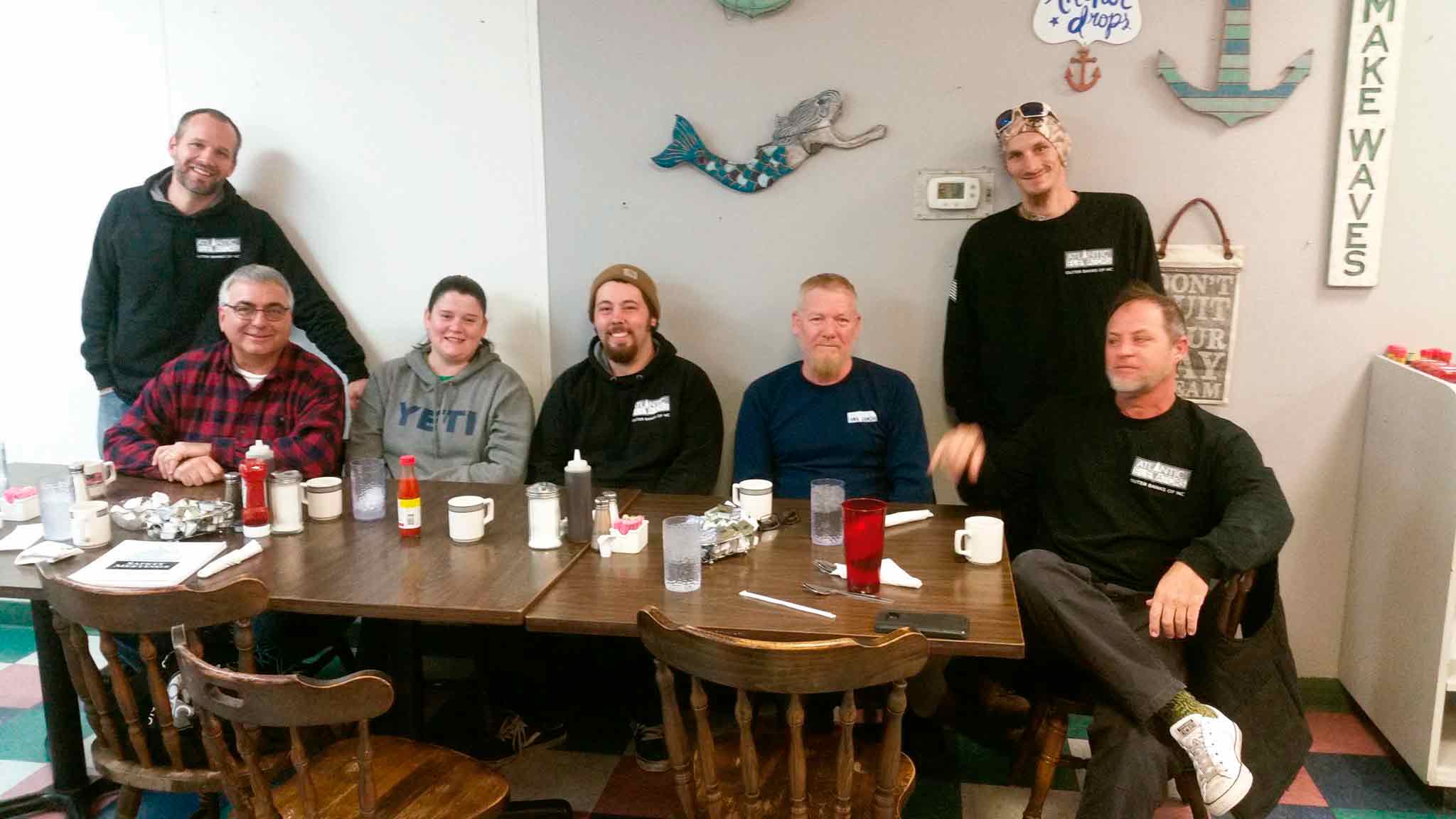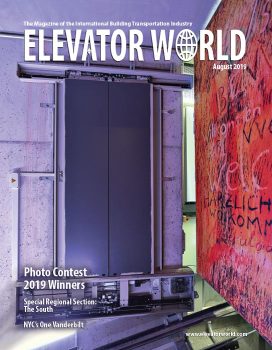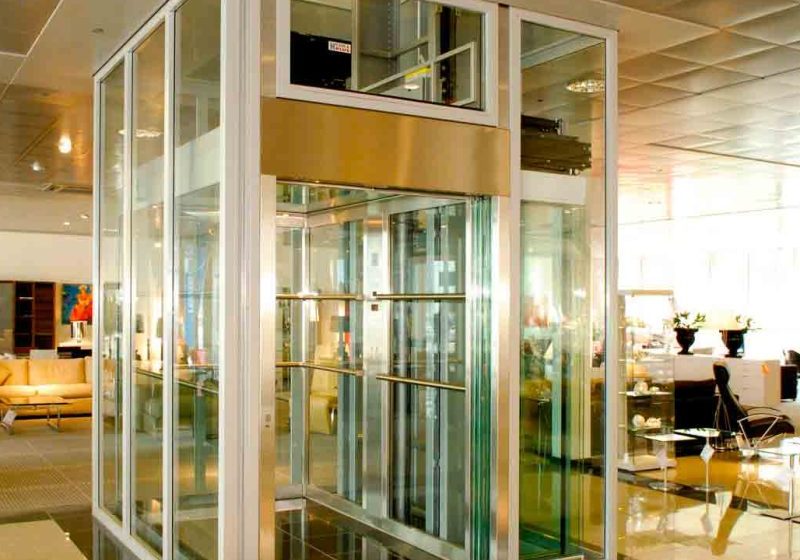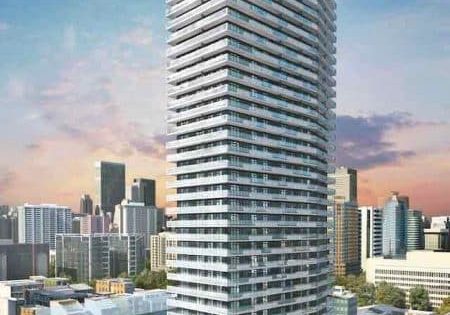The forecast is sunny for accessibility specialist Atlantic Elevators, serving N.C.’s Outer Banks and beyond.
Atlantic Elevators customers get pretty creative with their home-elevator designs, as evidenced by a quick look at the company’s website or Facebook page. Vibrant colors characterize a cab painted with a young, lei-wearing, surfboard- riding Elvis, and a shaft is brought to life by depictions of sharks, octopi and dolphins. These installations are in Nags Head and Kill Devil Hills, North Carolina, respectively, and are two of the roughly 1,200 home elevators the company has installed throughout eastern North Carolina and southeast Virginia since it was founded 17 years ago by four businessmen.
They included Bruce Austin, whose son, Joey Austin, started at the company as a helper in 2004, moved to California to work for ThyssenKrupp Access for a year and a half, then moved back home to North Carolina so his children could grow up close to family. Six years ago, Joey Austin became an owner, joining majority owner/silent partner R.V. Owens, who has been there from the beginning. With the rest of the original team either retiring or moving on to other endeavors, day-to-day operations are handled by a team that includes Joey Austin.
The company is headquartered in the centrally located Outer Banks town of Kill Devil Hills — a bucolic beach community perhaps best known as being the site of the Wright brothers’ first controlled, powered airplane flights in 1903.[1] It began as a ThyssenKrupp Access provider, with more than half of its installations — 700 — being that brand. When ThyssenKrupp Access folded in 2012, “it was tough,” Joey Austin said, but the company managed to transition to a new line of products thanks to being heavily involved in industry networking.
Your author caught up with Joey Austin recently at the 22nd Annual Elevator U Educational Conference in Charlotte. He shared that Atlantic Elevators belongs to the National Association of Elevator Contractors (NAEC), North Carolina Homebuilders Association, National Association of Homebuilders and the Outer Banks Home Builders Association. He said networking, including at events like Elevator U and the upcoming NAEC conference in Grand Rapids, Michigan, is — by far — the most effective way to grow the business. He also enjoys seeing new products and taking advantage of the continuing education offered.
Perhaps most importantly, however, are that such events provide an opportunity for people to see “the big picture.” He said:
“Last year I took one of our techs, who has been in the industry 16 years, to the NAEC convention in Atlantic City, [New Jersey] and it was pretty cool for him to see all the vendors, dealers and educational offerings. I feel like [such events] open your eyes to how big this industry is, and how small it is at the same time. That’s what really attracts people. It would be great if there were a way to take young trainees to conventions and say, ‘Hey, this is what the elevator industry is about; this is what it has to offer.’ It gives them a sneak peek into the industry.”
Joey Austin is comfortable with his company’s focus on a relatively small range of residential and accessibility products. “Cheeseburger, cheeseburger, cheeseburger,” he said. “We try to keep it simple.” Atlantic Elevators sells elevators by Cambridge, Harmar, Inclinator and Savaria.
A certified Aging-in-Place specialist, the company expanded its offerings this year, adding Staying HomeTM Corp. products including stairlifts, platform lifts, dumbwaiters and what is described by the company as the industry’s only battery-powered home elevator, the SHC®. It can conserve costs and be retrofitted into existing homes.
Atlantic Elevators installed a model SHC elevator in its Kill Devil Hills showroom in March. So far, Joey Austin said, response has been positive among builders and, particularly, real estate agents. He stated:
“This type of product is geared directly to homeowners and Realtors who are trying to sell homes that are accessible and age-proof. Installing the SHC elevator is really just a matter of cutting a hole in the floor; they don’t have to reconfigure the house. When someone wants to buy a home here, particularly an older buyer who is purchasing a true second home to which they will eventually retire, they are thinking, ‘How can I add an elevator to this home?’ That’s because just about every house here is on stilts. The SHC elevator solves that problem in an affordable way.”
Elvis and octopi aside, Atlantic Elevators customers nearly always go with a standard cab and shaft with very little in terms of bells and whistles. Some customers handle shaft and cab decoration themselves, but the company also has a stable of local artists and vinyl-wrap companies it calls upon. Often, since their homes are on the beach, customers go with nautical themes, with flourishes such as a ship’s wheel on the wall or a compass on the floor.
The team is coming off its busiest season — summer — when a population of approximately 35,000 can surge to roughly 250,000 on weekends and holidays. This leads to not only a flood of service calls, but also logistics issues. Joey Austin elaborated:
“There is a four-hour radius for our area, and traffic can be very difficult. On a Saturday, we have maybe 400 elevators that are on the north end of the beach, and, in heavy traffic, it might take hours for one of our technicians to get there. The customer doesn’t want to pay for four or more hours of labor, and I don’t blame them. To address this, we’ve provided free training to real estate companies’ maintenance guys, who can respond in 30 minutes or less, versus several hours.”
Because it would be cost-prohibitive, home elevators typically lack features such as the automatic, sensor-controlled doors that commercial units have. When customers (often, holiday renters) encounter a home elevator, they expect the doors to open and close automatically. Joey Austin said he has personally driven several hours to close a gate for a confused customer. Other service issues include replacing motherboards, car operating panels and backup batteries — a frequent occurrence due to power outages caused by summer storms. “It could be as simple as just telling the customer or renters how to use the elevator,” Joey Austin observed. “And, as soon as you do that, you don’t have any problems.”
The company makes an effort to have as much instructional material on hand as possible and, in some cases, one of its employees or a trained real estate employee to talk to users face-to-face. “Most of the issues are operator error,” he said. “Sometimes, a person just has to be told or, better yet, shown, that he has to press a button to close an elevator door.”
While he has found that advertising is a great way to establish the company brand, perhaps the most important thing has been word-of-mouth. Testimonials on the company website are provided by business partners such as Pogie Worsley of Carl Worsley & Associates. Atlantic Elevators has partnered with Worsley since 2003 on new installations and retrofits. The company, Pogie Worsley said, provides “first-class” communication, service and quality. He says, “Atlantic Elevators’ team is No. 1 in my book and definitely on my ‘A’ team!”
References
[1] en.wikipedia.org/wiki/Kill_Devil_Hills,_North_Carolina
[2] Area Access Stairlift and Elevators Blog, “What the ThyssenKrupp Access Closure Means For You,” August 17, 2016.
Get more of Elevator World. Sign up for our free e-newsletter.










